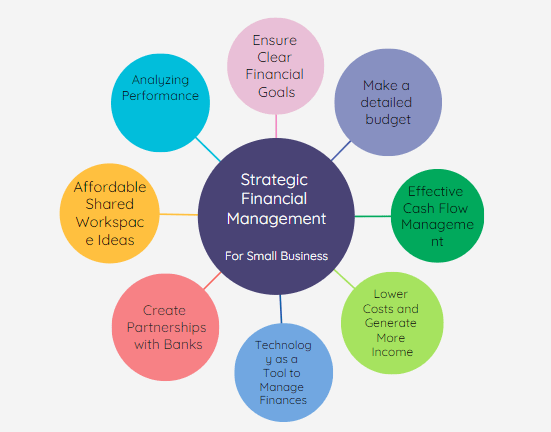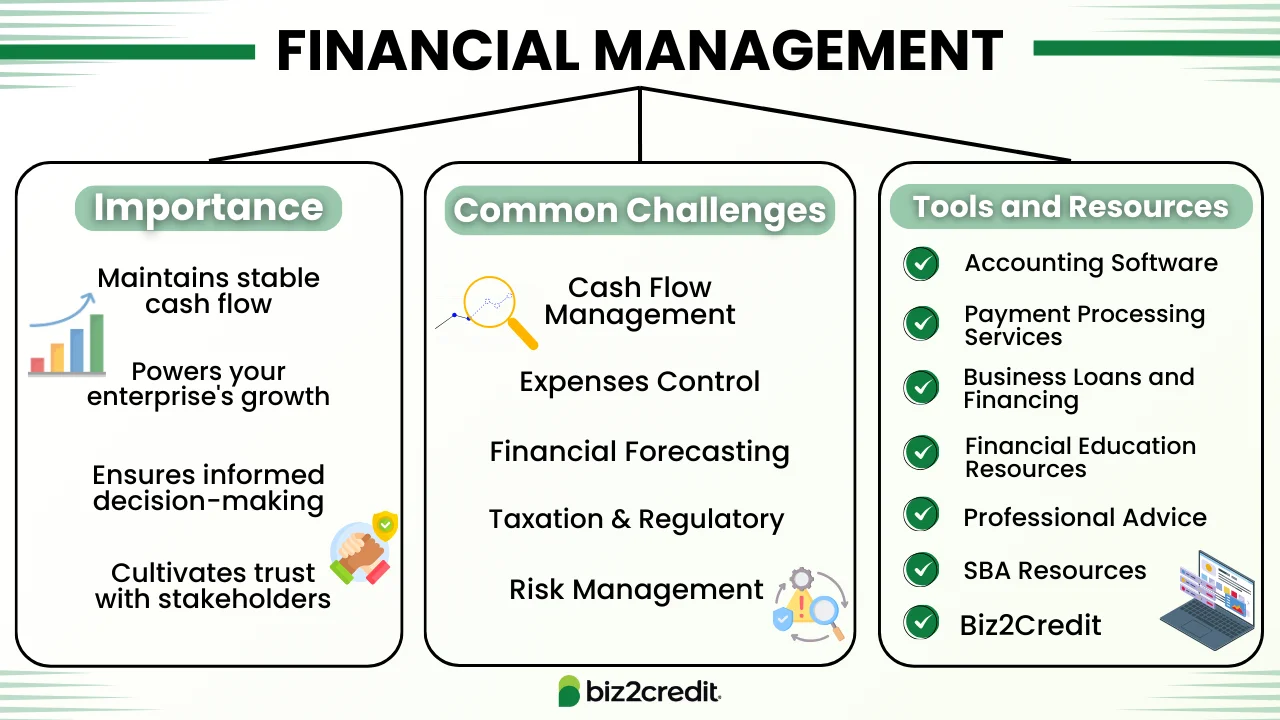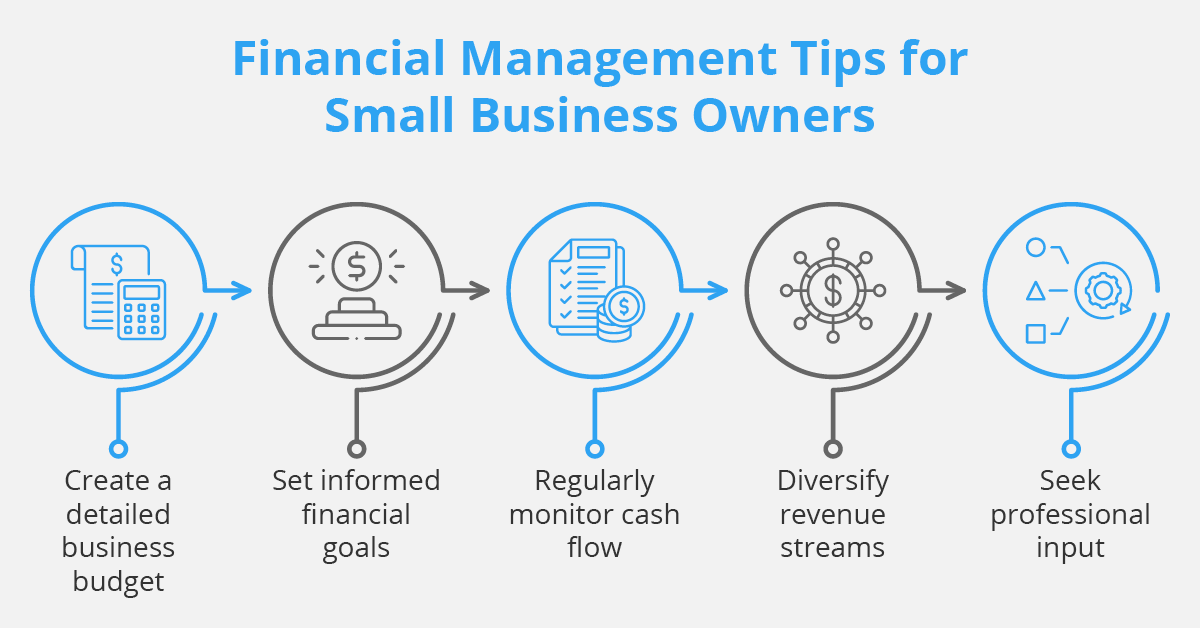Understanding Financial Management for Small Businesses
In today’s competitive market, obtaining financial acumen is crucial for small business success. Financial management involves making smart decisions about how to use resources effectively to achieve business goals. For small businesses, it serves as the backbone for sustainability and growth, ensuring that they do not just survive but thrive.
Effective financial management requires understanding key financial concepts. This creates a robust framework for making choices about investments and expenses, which can significantly impact the business’s bottom line. Small businesses, with their limited resources, must be particularly adept at forecasting financial needs and wisely allocating available funds.
Moreover, financial management encompasses everything from budgeting—creating structured plans for managing finances, to analyzing financial performance, which helps in measuring success and identifying areas for improvement.

Budgeting and Financial Planning
A significant aspect of financial management is budgeting. Creating and maintaining a realistic budget is essential for predicting income and expenses. It involves assessing financial data, considering potential risks, and accurately projecting financial scenarios. Without an effective budget, small businesses may overlook potential financial pitfalls, leading to cash shortfalls.
To enhance understanding and provide practical insights into financial management strategies, resources like the U.S. Small Business Administration offer guides and tools that can be invaluable. Their trustworthy resources can provide additional assurance and knowledge to reinforce a small business’s financial strategy.

Educating and Adopting Best Practices
Continual education in financial management is crucial. Encouraging a culture of financial literacy within an organization can empower team members, leading to better financial decisions and innovative cost-saving strategies. Adopting best practices like regular financial reviews, utilizing accounting software, and consulting with financial professionals can assist in optimizing financial health.
In summary, mastering financial management is imperative for small businesses. It ensures they stay financially viable and positioned for future growth. By implementing well-structured financial strategies, small businesses can confidently navigate the challenges of today’s economic landscape and secure their business’s longevity and success.
Importance of Budgeting
Budgeting is the backbone of effective financial management for small businesses, serving as a roadmap to achieving both short-term and long-term goals. By understanding the importance of budgeting, small business owners can make more informed financial decisions, optimize resources, and mitigate risk.
Creating a Realistic Budget
Creating a realistic budget is paramount for small businesses aiming to thrive in a competitive landscape. A well-defined budget provides a clear picture of where your business stands financially and what strategic steps are needed to grow. Start by evaluating your historical financial data and projecting future revenues and expenses. Make sure your budget is detailed and accounts for all business areas, including:
- Fixed costs such as rent, salaries, and utilities.
- Variable expenses like raw materials, marketing, and production costs.
- Potential unexpected expenses that might arise.
Utilize digital tools or professional accounting software to streamline this process. The U.S. Small Business Administration offers comprehensive resources to guide you here that are insightful for beginners. By factoring in realistic sales forecasts and cautious financial planning, you ensure that your budget aligns with your business objectives.

Monitoring and Adjusting Your Budget
Budget creation is only the first step; continuous monitoring and adjusting are equally crucial. A dynamic budget is the hallmark of a successful business, as it reflects your ability to respond to market changes and internal performance shifts. Regularly review your financial statements, including your profit and loss statement and balance sheet, to assess your business’s financial health.
Here are some tips for effective budget monitoring:
- Implement monthly or quarterly financial reviews to track progress against your budget targets.
- Use software tools to automate tracking and reporting to save time and minimize errors.
- Be prepared to adjust your budget in response to variances, whether due to unexpected expenses or fluctuating revenues.
By maintaining flexibility and adaptability through ongoing budget adjustments, you can ensure your business remains on a steady financial course. This proactive approach not only prevents overexpenditure but also enhances your ability to capitalize on new business opportunities.
In conclusion, budgeting stands as a critical component of financial planning for small businesses. Emphasizing the creation of a realistic budget and diligent monitoring ensures the long-term sustainability and growth of your enterprise.
Cash Flow Management Strategies
Effective cash flow management is a cornerstone for any small business aspiring not only to survive but thrive. Properly assessing and projecting cash flow can avert financial hurdles and set the stage for sustainable growth. Let’s delve into actionable strategies every small business should implement.
Assessing Cash Flow Needs
The first step in mastering cash flow is assessing your cash flow needs. Start by understanding the cash inflows and outflows over various periods—daily, weekly, monthly, or annually—and identify patterns or discrepancies:
- Track every expense: Every dollar out matters. Maintain a comprehensive record of all expenditures, from office supplies to payroll.
- Monitor revenue sources: Regularly review your income streams. Assess which products or services generate the most revenue and how seasonal variations affect your income.
- Analyze working capital: Determine the capital required to support the business’s operations effectively. This may involve calculating the needed cushion to manage unexpected expenses and ensuring you have enough funds to seize new opportunities.
Pro Tip: Engage financial tools or hire a professional accountant to conduct a regular cash flow analysis. This ensures a clear understanding of where your business stands financially.
Implementing Cash Flow Projections
Establishing accurate cash flow projections is crucial for anticipating future financial conditions and making informed decisions. Here’s how to implement an effective projection strategy:
- Use historical data: Begin with historical financial data to predict future cash flows. This forms the basis for spotting trends and making future predictions.
- Incorporate economic variables: Consider external factors such as market trends and economic conditions that may impact your business. An adjustment in these variables can significantly affect your projections.
- Scenario analysis: Adopt a proactive approach by evaluating different scenarios. What if sales increased by 10%? What if a major supplier raised prices? Better preparation for these contingencies can help you pivot smoothly.
Statistics from the U.S. Small Business Administration indicate that poor cash management is a top reason 82% of small businesses fail. Hence, ensuring a robust cash flow strategy isn’t just beneficial—it’s vital for survival and growth.

Leverage expert insights and industry-leading resources such as Investopedia to deepen your understanding of cash flow best practices.
A strategic approach to cash flow not only stabilizes your business but also equips you to confront financial challenges with confidence. As you refine your cash flow management, you set a solid foundation for broader financial success and efficiency.
Small Business Accounting Practices
Choosing the Right Accounting Method
Selecting the right accounting method is pivotal for small businesses aiming to maintain financial accuracy and transparency. There are primarily two methods from which to choose: the cash basis accounting method and the accrual basis accounting method.
- Cash Basis Accounting: This method is simpler and often preferred by small businesses with straightforward financial landscapes. Revenue and expenses are recorded when cash changes hands, providing a clear picture of cash flow. It’s advantageous for businesses that conduct transactions in cash and have limited receivables.
- Accrual Basis Accounting: For businesses with more complex operations, this method records income and expenses when they are incurred, regardless of when the cash is received or paid. It offers a more comprehensive view of a company’s financial health and is preferred to meet accounting standards by regulatory bodies like the Generally Accepted Accounting Principles (GAAP).
For a deeper understanding of these methods, the IRS provides detailed guidance about how each method works and its implications on business taxation.
Maintaining Accurate Financial Records
Effective financial management hinges on the ability to maintain accurate financial records. This practice not only supports regulatory compliance but also equips small business owners with critical insights into their financial performance and strategic decision-making.
- Automate Where Possible: Using accounting software can drastically reduce human error while increasing efficiency in tracking financial transactions. Solutions like QuickBooks or Xero offer customizable features to suit specific business needs.
-
Regular Reconciliation: Schedule routine reconciliations between your financial records and bank statements. This practice helps in identifying discrepancies promptly, ensuring your records reflect actual financial positions.
-
Documentation and Backup: Ensure all financial transactions are properly documented, with receipts and invoices systematically organized. Additionally, backup data regularly to prevent data loss due to unforeseen circumstances.
-
Consult Professional Services: Engaging with a professional accountant or financial advisor can provide tailored insights and ensure compliance with relevant financial regulations, facilitating informed business decisions.
Maintaining meticulous financial records not only aids in improving business accuracy but also fosters a proactive financial strategy, crucial for sustainable business growth.
By implementing these accounting practices, small businesses can efficiently navigate financial challenges and leverage insights for success. Visit Wikisearch.io to explore more about financial strategies and tailor solutions that empower your business.
Financial Forecasting Techniques
Benefits of Financial Forecasting
Financial forecasting is a critical practice for small businesses aiming to achieve long-term stability and growth. By anticipating future financial conditions and trends, businesses can make informed decisions that drive strategic planning and efficient resource allocation. Here are some compelling benefits of financial forecasting:
- Informed Decision-Making: Forecasting provides vital insights that enable businesses to make decisions based on data-driven projections rather than speculation. This minimizes risks and maximizes success potential.
-
Resource Optimization: By predicting future income and expenses, businesses can allocate resources more effectively. This leads to improved operation efficiency and cost management.
-
Enhanced Financial Planning: Accurate forecasts allow small businesses to prepare for potential challenges such as cash flow disruptions, ensuring they are better equipped to handle emergencies.
-
Investor Confidence: Providing a well-researched financial forecast can bolster investor confidence, as it demonstrates a clear understanding of the business’s potential and strategic financial outlook.
-
Goal Alignment: Forecasting helps businesses set realistic performance goals, ensuring that all departments work synergistically towards achieving market objectives.
For more detailed insights on the importance of financial forecasting, consider exploring this comprehensive guide on financial forecasting.
Tools for Effective Forecasting
To harness the full potential of financial forecasting, it is essential to utilize the right tools. Here are some tools for effective forecasting that can transform raw data into strategic insight:
- Spreadsheet Software: Programs like Microsoft Excel or Google Sheets are invaluable for creating and customizing financial models. They offer flexibility and are excellent for small businesses with straightforward forecasting needs.
-
Accounting Software: Platforms such as QuickBooks or Xero provide built-in forecasting tools, allowing for seamless integration with existing financial data for more accurate projections.
-
Forecasting Software: Dedicated tools like PlanGuru or Adaptive Insights offer advanced features such as scenario analysis and automated data processing, vital for complex forecasting requirements.
-
Customer Relationship Management (CRM) Tools: Integrating financial forecasts with CRM tools like Salesforce can enhance predictive analytics by incorporating sales pipeline data, resulting in more comprehensive forecasts.
-
Business Intelligence (BI) Tools: Applications like Tableau or Power BI offer robust analytics capabilities, enabling small businesses to visualize financial data trends and uncover actionable insights.
By leveraging the right combination of these tools, small businesses can improve their forecasting accuracy, ultimately leading to more informed strategic decisions. Investing in the appropriate technology not only streamlines the forecasting process but also provides a competitive advantage in today’s rapidly evolving marketplace.
Conclusion: Best Financial Practices for Small Businesses
Implementing effective financial management strategies is essential for small business sustainability and growth. Throughout this guide, we’ve discussed the critical components of financial management, including impactful budgeting, efficient cash flow management, diligent accounting practices, and insightful financial forecasting.
Key Takeaways for Success
- Adopt Comprehensive Budgeting: Craft a well-researched and realistic budget to set a financial roadmap for your business. Regularly monitor and adjust this blueprint to adapt to changing economic conditions and business needs.
-
Optimize Cash Flow Management: Maintain a close eye on your cash inflows and outflows. Implement cash flow projections to anticipate future financial states and make informed strategic decisions. Use tools and techniques, like the cash conversion cycle, to improve your cash handling processes.
-
Implement Robust Accounting Practices: Choose the most suitable accounting method for your business and consistently maintain accurate financial records. This practice not only ensures compliance but also provides transparency that can inform major business decisions.
-
Invest in Financial Forecasting: Utilize financial forecasting to anticipate market trends and align your business strategies. By leveraging advanced forecasting tools, you can visualize potential challenges and opportunities, enhancing your ability to pivot swiftly in the business landscape.
Building a Future-Proof Business
For continuous success, businesses should integrate these best practices into their financial management systems. This proactive approach not only secures the present health of the business but also builds resilience against future uncertainties. Regularly revisiting and refining your financial management practices keeps your business competitive.
To further enhance your understanding, consider exploring resources like the Small Business Administration for updated guidelines on financial management. By embracing these best practices, small businesses can achieve long-term success, stability, and growth, carving a path forward in the competitive marketplace.
For more in-depth tips and guidance on small business management, visit WikiSearch.

